An Encore for Macca?
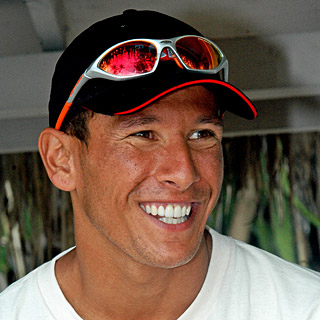
Chris McCormack made the leap from excitable lad to a cool competitor who could not be rattled in his near 20-year career in triathlon. Along the way, he won the ITU short course World Championship in 1997, a ton of short course titles including Escape From Alcatraz, Chicago, Los Angeles and the Goodwill games, five straight Ironman Australia titles, won Challenge Roth four times and broke eight hours there twice. And after three years of struggle at Kona, Macca took 6th in 2005, 2nd in an exciting 2006 duel with Normann Stadler, won in 2007, took 4th in 2009 and won again last October in a stirring duel with Andreas Raelert.
Now he is closer to the end. He will be 38 when he defends his second Kona title – older than any previous winner of the sport’s greatest prize. After pulling out all the stops with a reduced schedule to accommodate his advanced age last year, McCormack still plans to get the most out of himself in 2011. At the same time, he is concerned about the future of the sport he loves and offered some thoughts on the state of triathlon during a telephone interview from Sydney this week.
Slowtwitch: After 2009, some people thought that 4th place was your last gasp at Kona. What did you think?
Chris McCormack: To my way of thinking, that race put me back in the game. Emotionally I thought 2009 was a phenomenal day. Honestly 4th place was the best I could do. I’ve had better days than that. But I didn’t feel like I was outplayed. I didn’t feel that these guys were better than me. I did not feel it was time to walk away. No. I thought I can tidy up a few things and come back and run for the win. No one else saw it as a positive for me. They said ‘You got 4th. You are done.’ I came away from 2009 and thought I had a bloody brilliant race. Just my swim was crap [McCormack’s 52:51 in 2009 was 1:54 behind Craig Alexander, 1:51 behind Andreas Raelert, and 1:44 behind Chris Lieto – and it was 1:15 slower than his 2010 swim]. But that is the bloody game, that’s triathlon today. I came in uninjured, nothing was wrong, I just swam crap. I just said let’s tidy up all the little things we can. And for me it was all about the start. In the swim in 2010, I was attentive to where I was, and stayed near the front batch. I knew who was around me in the water.
ST: You and Andreas Raelert were dueling for the win later in the game than any men had done at Ironman Hawaii. In 2010 you had the fastest transitions in the field. Was your edge of victory even closer in the details than the final times would suggest?
Chris: After my 4th place finish in 2009, I realized that everything mattered and I took care of the details. I wanted to make sure the times of all my 2010 Ironman Hawaii transitions were improved. Last year I had a bad swim and had to work hard to pull 25 seconds back. So this year I sticky-taped straps to my helmet and shoes and my run bag. I had my socks stretched out and sticky taped ‘em to the shoes. Everything was well thought out.
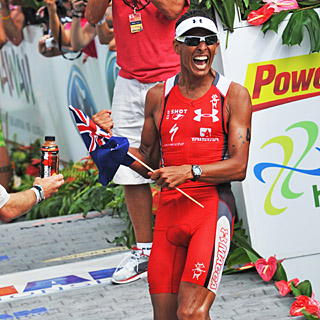
ST: What other details did you address for 2010?
Chris: I really thought about everything. I cleaned up all the details. I put almost all my nutrition on the bike. My special needs bag — you miss it half the time. It has come to the point these are the things that matter. I did this race [from 2002 onward] when those things didn’t matter and you could sit and change in the transition area for 3 minutes and put your run pants on. Those days are over. It’s going to get quicker in every phase and you have to make sure that you are as quick as it can be in every way.
ST: Did you really think it would be that close?
Chris: I didn’t know if it was going to be that close. But Ironman Hawaii is a total energy equation. You know who posts the fastest times, but if you waste time in transition, the clock does not stop. If you are not late getting out of T1 and T2, you save time and energy – which is a positive for me. I biked 54 seconds faster in 2010 [4:31:51 to 4:32:45 in 2009] and my transitions gave me another 35 seconds [a mistaken impression – McCormack was actually just 7 seconds faster overall in transition — 1:55 and 1:53 in 2009 to 1:43 and 1:58 in 2010]. That is a lot of free time I did not have to physically exert myself to get back.
ST: What are you doing now?
Chris: I am super busy working on a book which will be coming out soon. And now I am just getting fit and ready for Abu Dhabi.
ST: You and Crowie will debut there. Any rivalry involved?
Chris: I talked to Crowie today about it. We are supposed to hate each other. But we ride and swim together sometimes and chat about the Abu Dhabi race.
Chris: Why Abu Dhabi? You said one if your advantages at Kona last year was your reduced long course schedule?
Chris: Abu Dhabi will be an interesting kick start to the season. It’s a funny distance. [3km swim 200km bike 20km bike] I want to use it to kick off 2011. I am not going to worry about the results. It’s an off distance and it is a lot to ask to have that much endurance on the bike [12 miles more than the Ironman bike split] so early in the year. Guys get really aggressive to take the prize money. But I say they will pay for it later in the year.
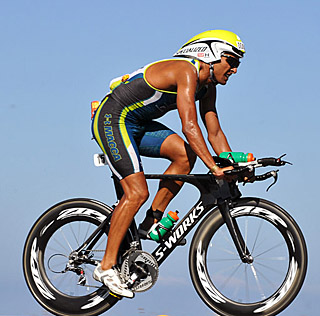
ST: How will the new Ironman Hawaii qualifying rules affect the sport?
Chris: The new WTC rules regarding Kona qualification are changing the game. The way it is set up, both Crowie and I as recent winners won’t have to qualify for Kona for five years since our last win. Still, Crowie and I will have to do one Ironman to take advantage of our status as Hawaii champions. But the rules will have an effect on the fields for other long course races. None of the Challenge races count. None of the Rev3 and Tri Star races will count. Which creates a really interesting dynamic this year. It is very, very different.
ST: How will the restricted field affect up and coming athletes who must accumulate points? How will it affect the race itself?
Chris: One of the biggest effects is that nowadays the athletes who must qualify on the points system cannot have a margin of rest and fitness that will allow them to do a good Ironman. There are only 50 slots for the pro men. And guys like Petr Vabrousek, who does at least 4 or 5 Ironman races a year, will have a huge advantage on points. It is a tough, tough task to qualify for Hawaii.
ST: Who can have a successful race at Abu Dhabi?
Chris: Guys who have put in early season Ironmans. [Eneko] Llanos has not done one yet. I think it is a mistake to have that kind of endurance in March. Why are you riding that hard if Kona is your primary objective? Guys like [Rasmus] Henning and Timo Bracht already have their key points after putting in a good race at Arizona. But as even more young guys come into the sport, this chase for points will ruin it for many of them.
ST: Are pros critical to the growth of the sport? Some race directors act as if they are irrelevant to the business of triathlon.
Chris: That kind of race promoters have to remember that lot of companies support their races. And their products are endorsed by the pros that race them. If a pro wins Chicago or an age grouper wins their division, people pay attention.
ST: Give us some examples?
Chris: Some race directors are acting as if the pros did not matter? That is BS. Kuota did not exist in the public’s mind until Normann Stadler put that bike on the map with his win in 2004 and sales with that company exploded. When I started riding Kestrels, sales increased. Successful companies support the pros and everyone benefits. I wonder why some race directors do not see that this is a triangular relationship. Age groupers, pros and races form a synergy like a food chain. You take one out and the whole thing can fall apart. If race directors are pushing that pros are not necessary, it hurts everyone. It is a mistake to make the assumption that people do not care who wins. Someone will win the race and raise his hands and people will notice and people will care. People are driven to push themselves harder to win. Age groupers too. Winners drive the whole sport. It is a complete circuit with its own synergy and you cannot just neglect it. I do think that some of the people in certain race series or federations may be tempted to try out models that are missing one of the elements. But the sport needs heroes to inspire people to continue to come in.
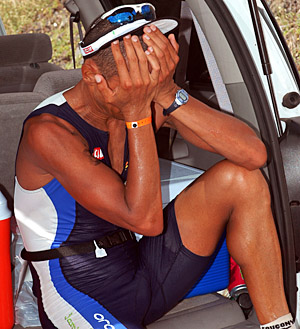
ST: What lessons do you draw from other sports in envisioning what is possible for triathlon?
Chris: I remember the first game of golf I ever saw in Australia. The announcer said that they were putting for a million dollars. I didn’t follow golf, but I could relate to a shitload of money that they could make playing golf. That made me watch golf. And so you need prize purses to spark an interest among the general public, the non-converted market. When there is a million bucks for the winner, everyone can comprehend the stakes, the drama, the game.
ST: Why do triathlon prize purses remain modest compared to these sports? Some say that any growing sport needs to adhere to the philosophy “every tub on its own bottom.” That is, don’t build a luxury product if it does not pay for itself.
Chris: Triathlon race directors and promoters are very, very conservative. I’m at the end of my game, so it would be easy for me to take them to task. But I am not here to criticize. The sport has been wonderful for me. I carved my way through it. I love the sport.
ST: Wouldn’t you feel a bit envious or even bitter if big prize money hit after your career was over? Sort of like Mickey Mantle with his $100,000 salary in 1965 looking at A-Rod’s $25 million a year.
Chris: I would love nothing more than to see Alistair Brownlee run for a million dollar prize purse. Good on ya, mate! That’d be fantastic! I think a big prize purse is important. The biggest sports in the world offer the biggest money.
ST: Which comes first, the growth of the business? Or can a daring promoter spur growth with a big prize purse?
Chris: When you ask which came first, the chicken or the egg in regard to prize money in sport? I say tennis used to be a big sport. But once they put up big money, it became huge. Poker is huge now because they are going to win 13 million bucks to win the World Series of Poker. And so far triathlon is not a part of that.
ST: What led you to realize where you stood in the world of sports champions?
Chris: After I won Ironman Hawaii in 2007, I was in Vegas to watch a big fight at a casino that pitted Rickey Hatton against Floyd Mayweather. There were some very important people watching. Someone introduced me: ‘This is Chris McCormack. He won Ironman Hawaii.’ The man I met said ‘Yeah? You won? Are you in Vegas to blow your money?’ I said ‘No.’ ‘Oh, what did you win? A couple million?’ ‘No, it was $110,000.’ He said ‘What!?’ He was embarrassed for the sport. He was thinking ‘You won $110k for that Ironman Hawaii race? In Vegas, the darts champion wins more than that. That is disgusting.’ He knew about the race but he pitied the sport. He saw it as a failure of the sport. This was a non-triathlete who knew of the sport thanks to the NBC broadcasts, and yet the champion won just $110,000.
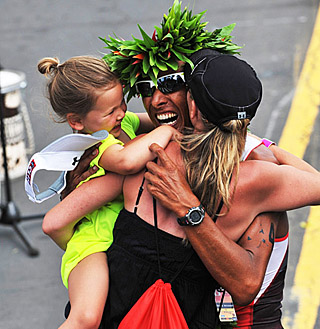
ST: Is this just an inevitable gradual growth of a tiny niche sport into the big time?
Chris: Triathlon is lucky to have broken through the first barrier – people know about it. But it takes a step back with the prize money for their greatest event. The assumption is that Ironman is not there at the top level. That they do not think their champion is worthy of serious money. Cycling made that jump. When Greg LeMond first won the Tour de France, he didn’t want to settle for $100,000. He helped lead the way to get the champions paid in the millions and Lance Armstrong raised the bar again. Now triathlon is still in its teething phase, and is going through a big growth struggle.
ST: The World Triathlon Corporation seems to be pushing hard to maintain and increase their dominance in the market and maximize their brand supremacy with the growth of the Ironman, Ironman 70.3 and their new 5150 series. Is this an illustration of a rising tide raises all boats? Or is it a Darwinian zero sum strategy?
Chris: Because the WTC own the Ironman brand, they feel they have to protect it. And to keep pace with the growth of the sport, they need other events which have credibility. It’s hard for independent events to build. But it takes courage to build other events which operate outside of the Kona sphere of influence.
ST: What do you think of relegating classic, historically important Ironman events in Australia and New Zealand to the lowest Kona qualifying points category [P-1000 each] and prize money [$50,000 for New Zealand and $25,000 for Port Macquarie] categories? Especially when the new Ironman race in Texas offers 4,000 points and a prize purse of $100,000.
Chris: Australia and New Zealand should be premier events because they have been around so long and they can draw on an honored history. I think of the great duel between Pauli Kiuru and Ken Glah, the closest Ironman finish in history, at New Zealand. And that epic duel between Peter Reid and Chris Legh, Lori Bowden smashing 9 hours, and Thomas Hellriegel setting a course record at Ironman Australia. I think the WTC needs to nurture that legacy. But now they only give Ironman Australia a few qualifying points and a small prize purse. It’s pathetic. Some of the sport’s greatest races have been held there. It’s sad.
ST: Why do you care so much? You aren’t suffering?
Chris: Now things are different (for me). I’m in the twilight of my career and I’ve done well. I feel for young athletes like Scott Llewellyn, who is reaching for the 2016 Olympics. And for rising long course triathletes like Paul Ambrose and Terenzo Bozzone, guys I’ve trained with. The sport is changing rapidly around them and they have no control, no way to really secure themselves and make a living and embrace the sport the way I remember it. It is much more difficult now. It’s a different mindset running the game.
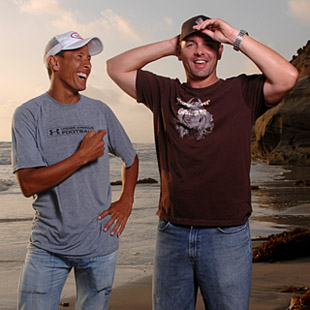
ST: You and Craig Alexander are dominant names in the sport now, but you are nearer the end than the beginning, relatively untouched by the new points system. What would have happened if you two faced this Kona points qualifying system at the beginning of your long course careers?
Chris: Crowie in my opinion has been the best triathlete on the planet for the past five years. His consistency at the half and Ironman distances has been great. But Kona is one that matters the most and he has 2nd-1st-1st-4th finishes which are inarguably the best over this span of time. Had this points system been in place years ago I think he would have been broken. He never would have been able to survive to allow himself to reach his potential in endurance sport. Chasing those points will kill kids in their 20s. It will kill bodies before they reach their potential. I think if you are not close to getting points to qualify for Kona early in the year, you are gone. Do not worry about Kona. I say if you keep chasing it and end up doing too many Ironman races, you can’t bring it at Kona. Look at Pete Jacobs. He is planning on doing Challenge Cairns and Frankfurt this year. Last year he did four Ironman races before Ironman Hawaii. He had a great run, but he might have made the podium if he had come to the race fresh. I am telling you the truth. I made that mistake in 2009. I raced seven 70.3s. That is why I felt flat at Kona in 2009. Talking it over with my team of advisers, we decided I raced too much. I am not the 25-year-old Macca any more. This year I will do Alcatraz, South Beach, and one Ironman and I will be fresh as a daisy. Every week last year I got news that Crowie raced another half. He emptied that tank. You ain’t 25, mate. I’m convinced he raced too much. I know because I made same error in 2009 and I justified that conclusion this year. When I raced that much in 2009, it made me flat. I didn’t have the edge. And in 2010, that edge just wasn't there for Crowie. He was just a little bit off. There was not that punch.
ST: Given how much he raced during the season, didn’t his 4th place finish show just how good he is?
Chris: The fact that he was just a little bit off underlined how great a performer he is to finish 4th. But the sport now forces over-racing upon all the up and coming guys. Now Crowie and I are in a luxury position where we only need to do one Ironman for each of the next five years to get to Kona. In 5 years I will be too old to race for the win. I think if we are smart, we will win two more. But the poor bastards who have to chase points are gonna kill themselves and their edge will be gone. It’s a difficult game now, mate. And I’m just very sorry for the new guys and glad I am not going to be affected by it.


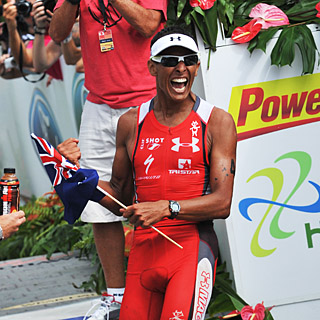
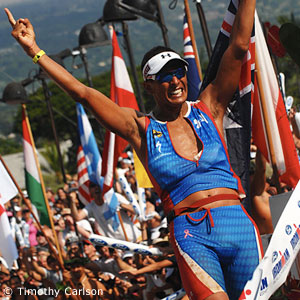
Start the discussion at slowtwitch.northend.network